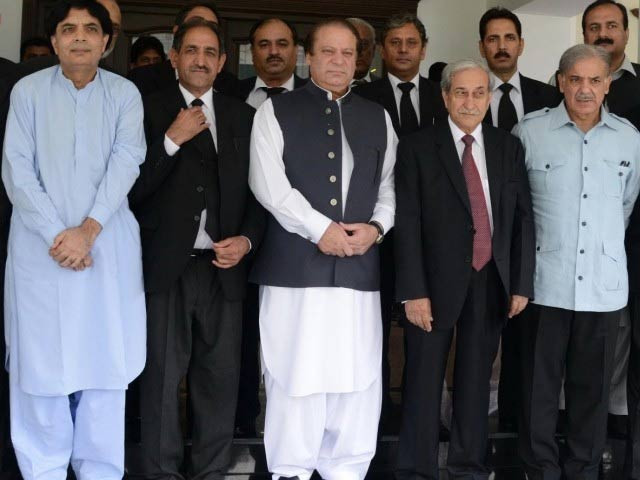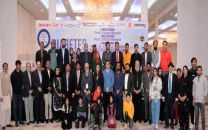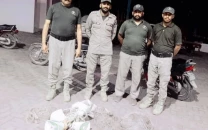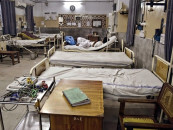Panamagate inquiry: Govt likely to stick to generic ToRs
Nawaz thanks nation for ‘rejecting unparliamentary forces’

Nawaz thanks nation for ‘rejecting unparliamentary forces’. PHOTO: INP
The government is willing for generic ToRs, but Imran Khan wants any inquiry into the allegations stemming from the Panama Papers about the ruling family’s offshore wealth to begin from Prime Minister Nawaz Sharif. This is the main point of disagreement between the PTI and the government. And neither side is willing to budge.
ECP summons Imran, Tareen on Nov 16
Wednesday’s cabinet meeting, chaired by Prime Minister Nawaz Sharif, pored over the issue and concurred that the same stance would be taken in the ToRs submitted in the Supreme Court on Thursday (today).
The government’s legal team would argue that members of the Sharif family and not the prime minister himself has been named in the Panama Papers; therefore, a Sharif-specific trial doesn’t merit, sources privy to the cabinet discussion told The Express Tribune.
“The government doesn’t care about evolving a consensus with the PTI on the ToRs,” said an associate of Nawaz. He referred to a series of meetings of the Parliamentary Committee on Panama Papers that failed to end the impasse on the ToRs.
“The Supreme Court hasn’t asked the government and the PTI for a consensus on ToRs. If there is no consensus, then the Supreme Court will take the matter into in its own hands – something that is acceptable to us,” he added.
In a statement issued from his office after the meeting, Premier Nawaz “thanked the nation for rejecting the un-parliamentary forces”. The obvious reference was to a dharna of the PTI which was called off at the eleventh hour after the Supreme Court ruling.
Sharif voiced satisfaction that the Panama Papers issue would be resolved by the Supreme Court. “I myself had approached the top court seeking formation of a commission to adjudicate the matter,” he recalled.
“The government’s earlier sincere efforts to legally resolve the issue were frustrated by the opposition which politicised the matter. Now, the matter is in the Supreme Court where it will be decided in accordance with the law of the land.”
Nawaz had “disallowed his legal team to discuss maintainability of the petition [on Panamagate], so that it could be admitted unhindered”, according to the official statement. Sources, however, said the government’s strategy in the Nov 2 hearing was to initially challenge the petition’s maintainability, but it changed its mind after sending that the apex court was inclined towards proceeding with the case.
133 ‘Panama’ individuals reply to FBR notices
Sharif’s Adviser Amir Muqam, who also attended the cabinet meeting, said the government wanted the Supreme Court to expedite the trial. Muqam said the PTI wanted to dictate its terms, which was not acceptable to the government.
“A political party in minority cannot impose its will on the majority party. Now the matter is in the Supreme Court and whatever decision it takes will be accepted in letter and spirit.” Muqam told The Express Tribune.
Agenda items
The cabinet took up 25 agenda items – of which three were deferred till next cabinet meeting while 22 were approved including the Draft Companies Bill 2016 moved by the cabinet division. The bill makes it obligatory on the corporate companies operating in Pakistan to declare their foreign investments “in order to address challenges posed by offshore companies,” according to the official statement.
“An enhanced disclosure regime for officers and members of those companies has been provided under the draft bill, while stringent penalties have been introduced in cases of false or non-disclosure,” it added.
The cabinet confirmed earlier approvals of other bills, including the Cabinet Committee on Disposal of Legislative Cases on Right of Access to Information Bill 2016, Teaching of the Holy Quran in Private And Public Schools Bill 2016, Alternate Dispute Resolution Bill 2016, Pakistan Climate Change Act 2016, Corporate Rehabilitation Bill 2016, Draft Companies Bill 2016 and Cost of Litigation Bill 2016.
It ratified Paris Agreement on Climate Change and gave approval for signing of Inter-governmental Framework Agreement for Peshawar-Karachi Motorway and Karakorum Highway Phase-II (Havelian-Thakot) Project.
Three agenda items were deferred; Repatriation And Management Policy for Afghan Refugees, National Maritime Policy 2015, and Accession to the Convention on the Civil Aspects of the International Child Abduction of October 25, 1980.
Published in The Express Tribune, November 3rd, 2016.



















COMMENTS
Comments are moderated and generally will be posted if they are on-topic and not abusive.
For more information, please see our Comments FAQ